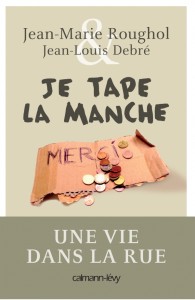December 15, 2015
From the pen of a French beggar, a bestseller is born
by Chad Felix
Jean-Marie Roughol, a panhandler on the streets of Paris for 27 years and running, has sold upwards of 50,000 copies of his memoir, My Life as a Panhandler: A Life on the Streets (Je tape la manche: Une vie dans la rue)—making him a bestseller and something of cult figure in France.
According to Martin Chilton at the Telegraph, the slim book, which was published by Calmann-Lévy this past October, was drafted by Roughol in school exercise books from the park benches and sidewalks outside boutiques on Avenue Montaigne in Paris.
As the title implies, Je tape la manche details the author’s decades on the streets, as well as his personal philosophies and a bevy anecdotes featuring some of the characters he’s encountered. Such characters include the actors Gérard Jugnot and Jean-Paul Belmondo (who gave Roughol ten euros), and the left-wing politician Jean-Luc Mélenchon.
As Chilton reports, it was one such chance encounter, that helped Roughol get the book underway:
[Roughol] was helped with editing and writing by former French interior minister Jean-Louis Debré, who got to know him after Roughol offered to look after his bicycle for him while he did some shopping on the Champs-Élysées. In the book Roughol tells how their friendship was cemented when a couple who saw them chatting, said, “Look, it’s Debré with a hobo.”
As a result of this collaboration, Debré receives an authorship credit on the book’s cover—as well as, you know, whatever political capital comes with helping a panhandler publish a memoir.
All skepticism aside, it would be hasty to declare that Roughol’s book is mere fodder for a politician, especially given the very real response the book has elicited. According to the Telegraph, Roughol told AFP reporter Cicile Azzaro: “Last week, I was taken to a restaurant by a man from Tennessee who bought 15 copies of my book, and another one came from Switzerland with chocolate for me!”
Indeed, Roughol’s world—aside from the notable fact that he remains homeless—has changed. With the advance from the publisher, for example, he was able to purchase a smartphone, which he uses to keep in touch with his growing number of fans on Facebook. Even better is the fact that the popularity of the book has helped to reintroduce (and in some cases introduce) Roughol to members of his family. As he tells the Telegraph:
[My long-lost brother] saw me on the TV and didn’t know I was homeless. When you are on the streets, you are ashamed and you turn in on yourself. Now I have nieces and nephews who want to meet me—imagine!—when I have always been alone.
Soon enough, Roughol will start earning royalties for Je tape la manche, which he plans to put towards achieving his dream of owning and operating a creperie. The author also hopes to rent an apartment and purchase a computer so he can continue to write books.
Until then, Roughol is more than content with the book’s immediate payoff: helping to change people’s perceptions of what it means to be homeless.
Chad Felix is the Manager of Direct Sales and Library Marketing at Melville House, and a former bookseller.
